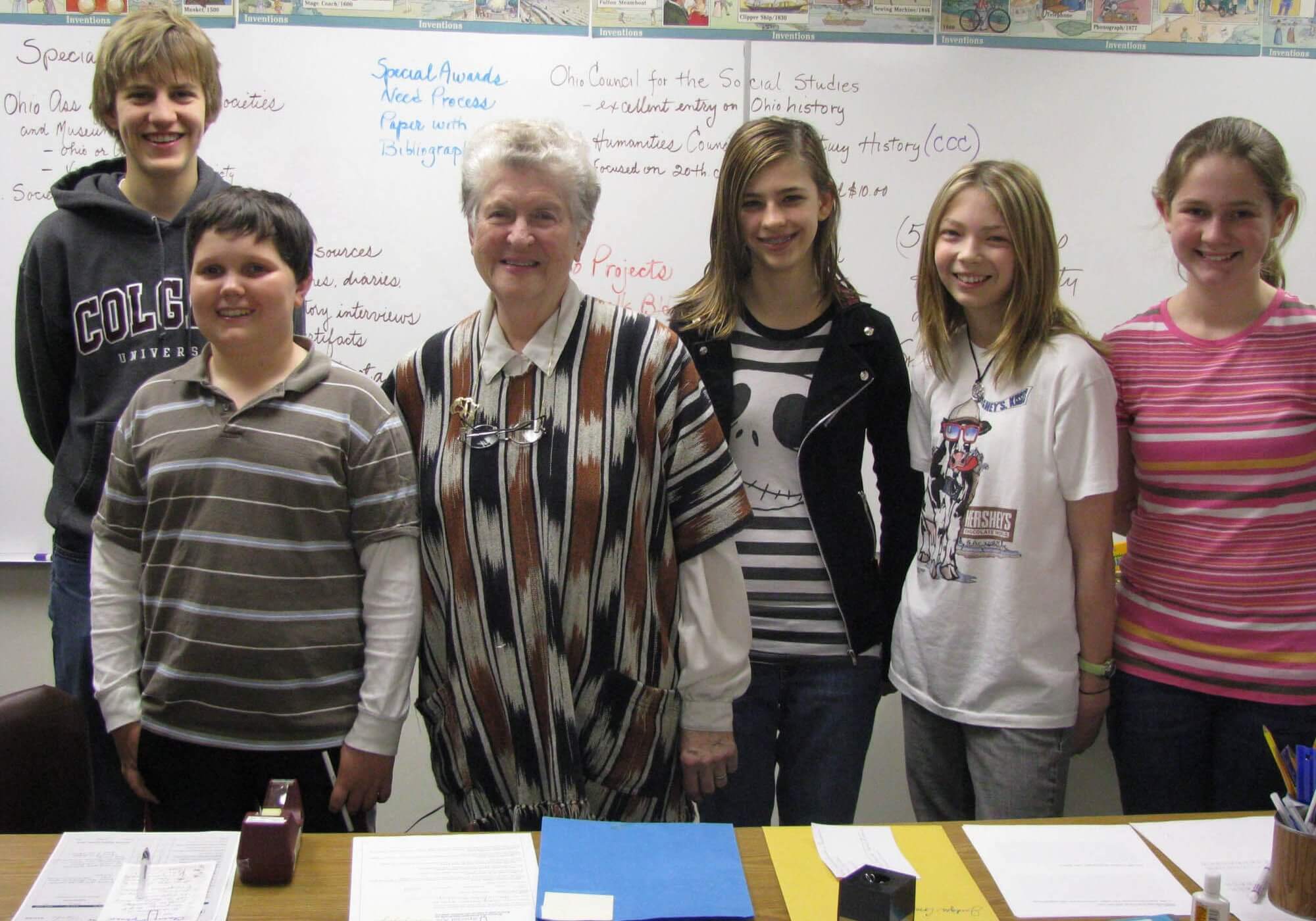
Quick Links
National History Day
Mercy Montessori has had a longstanding and very successful 'history' with National History Day! Since 1983, Mercy junior high students have been participating in the program and earning national recognition (click here to view our list of national champions).
What is History Day?
National History Day (NHD) is a non-profit education organization that hosts annual competitions at the regional, state, and national levels. It was founded in 1974 to encourage students in grades 7 through 12 to develop their research, critical thinking, and communication skills. Today, over half a million students from all 50 states participate in History Day contests each year.
We are grateful that Sr. Aloyse Gerhardstein involved the Junior High in this program back in 1992. Since that time, Mercy’s Junior High has been participating in History Day every year by creating projects and attending the regional competitions.
Each year, there is a specific theme that each competing project must relate to in some way. Our students begin their project process by selecting a historical topic of interest. Their second task is to relate their topic of choice to the given theme.
What does the project process look like?
Our students spend at least seven months of the school year on their History Day projects. The process begins with the selection of their topic and the relation of that topic to the given NHD theme. Each student is required to conduct research, write a research paper, compile a bibliography, and finally create a project to present.
September
- Students learn about primary and secondary sources
- Students search online, at school, and at local libraries for high-quality sources
- Students use a digital research portfolio to organize the information that they gain from their gathered sources
October
- Students write a thesis statement that explains their topic’s significance in history and relates their topic to the annual theme
- Students create an annotated bibliography of their sources according to MLA standards
November
- Students write an outline to guide the writing of their research papers
- Students write their research papers
December
- Students edit and revise their research papers
- Students edit and revise their annotated bibliographies
January
- Students choose what type of project they would like to create:
- Documentary
- Exhibit Board
- Historical Research Paper
- Performance
- Website
- Students review the specifications and regulations for their chosen project type
- Students begin to adapt the information in their research paper to the type of project they have chosen (script, storyboard, etc)
February
- Students continue to develop projects and annotated bibliographies
- Students write process papers that explain the following:
- How they chose their topic
- How they conducted their research
- How they created their project
- How they believe their topic relates to the annual theme
March
- Students make final changes to their projects, bibliographies, and process papers
- Students prepare for their judging interviews by answering sample questions
- Students present their projects to judges at the regional History Day competition
April
- Students who advance to the state competition make revisions to their projects based on feedback from the regional judges
- Students present their projects to judges at the state History Day competition
May
- Students who advance to the national competition make revisions to their projects based on feedback from the state judges
Why do Mercy students participate in History Day?
“So we realize that in order to develop the individual needs to display effort, [he needs] to exercise himself and not be dependent on others. Now this independence is acquired only by an effort. Liberty or freedom is the independence acquired by one’s own effort. It is evident that this is a formation, a growth, therefore only acquired by long experience. It is the “valorization” of the personality, to become aware of one’s own value.”
Dr. Maria Montessori, “Moral and Social Responsibility”
Participation in History Day helps our students to develop numerous skills, including research, writing, critical thinking, and communication. By the time they enter high school, our students know how to properly cite sources, organize research, create an annotated bibliography, and write a research paper.
Beyond the academic benefits that creating a History Day project offers, participation in the competition itself has a profound effect on the development of our students. Adolescents must be given opportunities to recognize what they are truly capable of, and the creation and professional presentation of their long-term research is one such opportunity.
Dr. Maria Montessori wrote about a concept called the “valorization of the personality”. This term refers to the solidification of an adolescent’s persona, and the realization that they are able to complete important, meaningful work. The structure and outcome of the History Day project allows our Junior High students to explore an interest, tackle large-scale research, create analytical projects, and present their hard work to educational professionals. All of these aspects contribute to their valorization by helping them acknowledge their value as independent, accomplished young adults.
